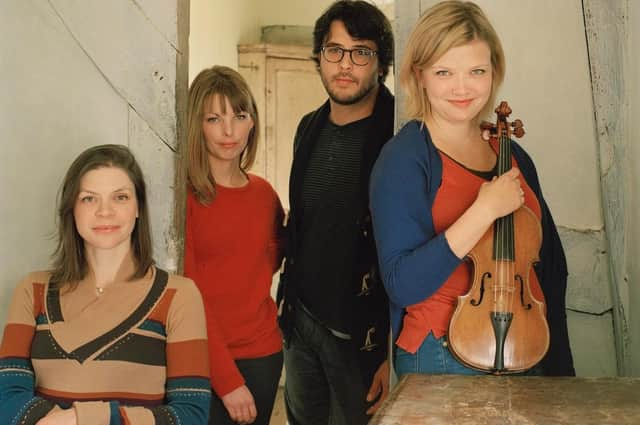Chiaroscuro Quartet play both Chichester and Lewes


They are also the latest guests in the international chamber music series offered by the Nicholas Yonge Society in Lewes. They perform on February 25 at Cliffe Building, East Sussex College, Mountfield Road, Lewes, BN7 2XH at 7.45pm. Tickets £20 (ages eight-25 free) on www.ticketsource.co.uk/nyslewes
The quartet are Alina Ibragimova, violin; Pablo Hernán Benedi, violin; Emilie Hörnlund, viola; and Claire Thirion, cello. Their programme will be: Purcell – A selection of Fantasias; Haydn – String Quartet Op 33 No 5; and Beethoven – String Quartet Op 59 No 3.
Advertisement
Hide AdAdvertisement
Hide AdFormed in 2005, Chiaroscuro Quartet was a prize-winner of the German Förderpreis Deutschlandfunk/Musikfest Bremen in 2013 and received Germany’s most prestigious CD award in 2015 for their recording of Mozart and Schumann quartets.
In the 2020-2021 season, Chiaroscuro Quartet gave concerts in the UK, including Wigmore Hall, King’s Place, and appeared at numerous other venues and festivals.
Alina said: “The quartet formed at Royal College of Music in London in 2005. In 2006 it was 250 years since the birth of Mozart and the early music department at college wanted to have a group perform a Mozart string quartet. When the project was over, we all liked each other so much that we decided to continue as a quartet. The plan was simply to keep playing. We feel very lucky to be able to work together and perform. We are now enjoying a career doing what we love the most. We travel all over the world, playing in festivals, venues of all kinds, large and small.
“The music business, much like many other industries, is extremely competitive. We worked very hard as a group in the beginning, and the countless weeks of rehearsal have paid off!
Advertisement
Hide AdAdvertisement
Hide Ad“We are what some people call historically informed. We use gut strings and period bows appropriate to the specific repertoire we are playing. We also tune slightly lower and use slightly less vibrato than you might be used to. We all studied baroque music at college but despite the influence this has on our approach to this style of music, our aim is not to educate the listeners.
“Playing this music in this way just makes sense to us somehow. We are, like all performers of course, aware of the origin of the music and we try to take this into account as well as make it our own. The sound the gut strings gives us the opportunity to explore such a variety of colours.
“We have four different nationalities and we are quite different people personality wise but as a group we complement each other very well. All striving for the development of the group, and the love for this music and each other makes us strong together.
“Our repertoire is mainly focusing on music from the classical and early romantic period but we have explored more modern music too.
Advertisement
Hide AdAdvertisement
Hide Ad“At first the focus was really on the core of the quartet repertoire, playing mainly music by Haydn, Mozart and Beethoven. We were able record some of these pillars in quartet repertoire and it is very much still a focus of ours. We have since then been able to explore lesser known repertoire and we are continuing to broaden our span into more romantic period music and further.
“Our next recording to be released will be the second volume of Beethoven Op 18, out at the beginning of March. We will also record another Beethoven album in the spring.
In the meantime we continue to play concerts all over Europe and next year will return to the US.”
Comment Guidelines
National World encourages reader discussion on our stories. User feedback, insights and back-and-forth exchanges add a rich layer of context to reporting. Please review our Community Guidelines before commenting.